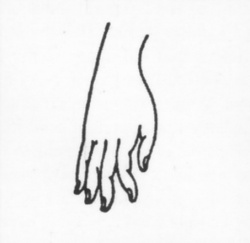Difference between revisions of "Bhūmisparśa Mudrā"
| (2 intermediate revisions by the same user not shown) | |||
| Line 1: | Line 1: | ||
[[File:BhumisparshaMudra.JPG|thumb|250px|]] | [[File:BhumisparshaMudra.JPG|thumb|250px|]] | ||
<poem> | <poem> | ||
| − | Earth-Witness Gesture | + | |
| − | Sjoquist p. 33 Bhūmisparśa Mudrā | + | |
| − | chùdì yìn 触地印 觸地印 | + | |
| − | This gesture is literally called | + | |
| − | + | ||
| + | [[Earth-Witness Gesture]] | ||
| + | |||
| + | |||
| + | [[Sjoquist]] p. 33 [[Bhūmisparśa Mudrā]] | ||
| + | |||
| + | [[chùdì yìn]] [[触地印 觸地印]] | ||
| + | |||
| + | This gesture is literally called “[[touching the earth]].” | ||
| + | |||
| + | |||
| + | |||
| + | It is said that when the [[Buddha]] was [[meditating]] under the [[fig tree]], he was approached by the lord of [[earthly]] [[illusion]], [[Mara]], who sought to divert him from his [[path to enlightenment]]. | ||
| + | |||
| + | But the [[Buddha]] moved his right hand from his position of [[meditation]] (now called the [[Dhyāna mudrā]]) and pointed down and called upon the [[earth]] itself to {{Wiki|witness}} that he had resolved the problem of [[suffering]]. | ||
| + | |||
| + | Thus he turned away [[Mara]] and his temptations. (Some say that he called upon [[earth]] to testify to his victory over [[Mara]].) | ||
| + | |||
| + | (This is probably a mythologized variant of the story told in [[chapter]] 16 of the on-line {{Wiki|biography}} of the [[Buddha]]. | ||
| + | |||
| + | This is [[mudrā]] is not seen except in {{Wiki|representations}} of the [[Buddha]] himself. | ||
</poem> | </poem> | ||
| + | |||
| + | |||
| + | |||
{{R}} | {{R}} | ||
[http://anthro.ucsd.edu/~dkjordan/chin/shoouyinn/MudrasDescribed.html anthro.ucsd.edu] | [http://anthro.ucsd.edu/~dkjordan/chin/shoouyinn/MudrasDescribed.html anthro.ucsd.edu] | ||
[[Category:Buddhist Terms]] | [[Category:Buddhist Terms]] | ||
[[Category:Bhumisparsha Mudra]] | [[Category:Bhumisparsha Mudra]] | ||
| + | [[Category:Buddhism]] | ||
Latest revision as of 13:15, 15 February 2024
Earth-Witness Gesture
Sjoquist p. 33 Bhūmisparśa Mudrā
chùdì yìn 触地印 觸地印
This gesture is literally called “touching the earth.”
It is said that when the Buddha was meditating under the fig tree, he was approached by the lord of earthly illusion, Mara, who sought to divert him from his path to enlightenment.
But the Buddha moved his right hand from his position of meditation (now called the Dhyāna mudrā) and pointed down and called upon the earth itself to witness that he had resolved the problem of suffering.
Thus he turned away Mara and his temptations. (Some say that he called upon earth to testify to his victory over Mara.)
(This is probably a mythologized variant of the story told in chapter 16 of the on-line biography of the Buddha.
This is mudrā is not seen except in representations of the Buddha himself.
